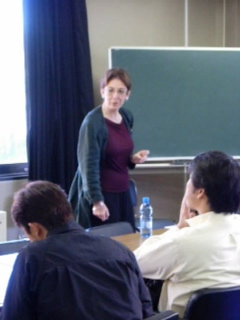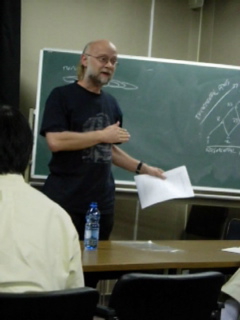2004年10月15日: Susan Rothstein, Two Puzzles for a Theory of Lexical Aspect: Semelfactives and Degree Achievements;
Fred Landaman, 1066: On the Differences between the Tense-Perspective-Aspect Systems of English and Dutch
[日本語 | English]
- とき:
- 2004年10月15日(金)3:30pm
- ところ:
- 東京大学教養学部/総合文化研究科(駒場Iキャンパス)10号館3階会議室
-
発表1
- 3:30pm
- 講演者:
- Susan Rothstein (Bar-Ilan University)
- タイトル:
- Two Puzzles for a Theory of Lexical Aspect: Semelfactives and Degree Achievements
- 概要:
-
In this talk I examine the semantic basis of the classification of
verbs into the four Vendlerian classes (states, activities,
achievements and accomplishments), and I address the question of what
to do about semelfactives such as kick, jump
and skip, which appear
not to fit into any of these classes (Smith 1991), and degree
achievements such as cool and darken which appear to
belong to too
many classes (Absuch 1985, 1986). I argue that the features
characterising the four basic verb classes are whether or not the
minimal events in their denotations are or are not inherently extended
in time, and whether or not these events are characterised as events
of change. I discuss the contrast between minimal and non-minimal
events and show that the semelfactive/activity homonymy results from
the distinction between minimal and non-minimal activity events. The
properties of degree achievements arise from the characterisation of
the minimal events in their denotation as changes in scalar values
rather than changes from a state in which p holds to a state in which
not p holds.
-
発表2
- 5:00pm
- 講演者:
- Fred Landman (Tel Aviv University)
- タイトル:
- 1066: On the Differences between the Tense-Perspective-Aspect Systems of English and Dutch
- 概要:
-
In this talk, I propose that, in the development from Anglo-Saxon to
Modern English, a markedness system of semantic perspective and aspect
was replaced by a lexical system, and that Dutch retains the older
markedness system. I develop a theory of tense, perspective, and
aspect, which I call 1066, in which these notions, and the proposals,
are made precise. After that, I discuss several differences between
English and Dutch, and I argue that these differences directly follow
from this one change. I mention some other differences which can be
analyzed as (minor) changes in English, made possible by this change.


意味論研究会
21世紀COE<心とことば−進化認知科学的展開>共催
Last modified: 2004-10-17 13:05:39 JST



